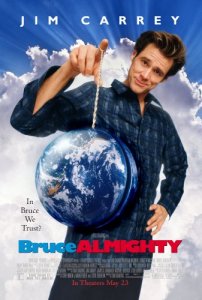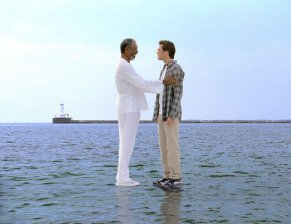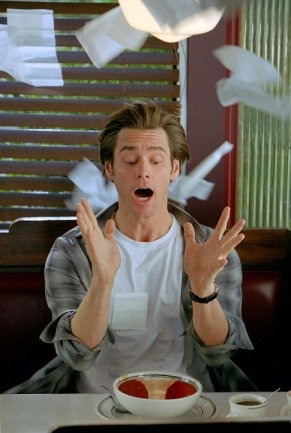|
Bruce
Almighty
For a
long time, Jim Carrey has been striving to prove to his audience
that he's both a fine comedian and a capable dramatic actor.
If he could somehow combine the two sides of himself into
one film, he might achieve the stature of one of his apparent
idols, James Stewart.
And so
after failing (relatively speaking) in straight dramas like
Man on the Moon and the vaguely Capra-esque The
Majestic, Carrey stumbled across a script that seemed
able to reconcile his warring halves.
At least,
that's what we can assume about Bruce Almighty, a film
with a mighty high concept and the potential for either a
real exploration of faith or a wicked satire. Instead, Carrey
and director Tom Shadyac play safe with a few wacky hijinks
here, some safe platitudes there, never straying out of a
comfort zone for fear of alienating any audience. The clay
man of this film never gets a real breath of life.
It's
not without laughs, but they come from moments of random silliness
that don't quite fit the allegedly realistic setting. As Bruce
Nolan, the rubber-faced actor plays a human interest reporter
for a Buffalo, New York television station. He's a nice guy,
because the script says so, hoping for a promotion to anchorman.
But on
the day he believed the promotion was coming, an unctuous
and somewhat dull-witted rival (Steve Carell from The Daily
Show) steals both Bruce's style and the job. Tearful and
live from the phoniest-looking Niagra Falls on film, Bruce
self-destructs before his audience.
At home
he curses his faithful long-time girlfriend Grace (Jennifer
Aniston), gets mad at his dog, and suffers a few more indignities
before cursing the creator for having turned on him. For some
reason only known to the filmmakers, this pushes the Almighty
(Morgan Freeman) over the edge.
Tired
of Bruce's whining, He offers the mortal his powers for an
unspecified amount of time. If he really thinks he can do
a better job, then he's welcome to try. There are only two
rules: Bruce can't tell anybody that he has the powers of
the Lord, and he can't interfere with free will.
It's
a ripe premise, in a good way. Yes, there are a lot of wacky
things to be done with a guy suddenly handed omnipotence.
For a few moments, it looks like they might even do some.
But after
a few explorations of the power (some of it in the montage
featured in the commercial), Bruce pretty much bobbles the
whole thing. Given the power because he thinks he can improve
things, all he does is make his own life work.
To do
that, he arranges for natural disasters to happen while he's
around with a news camera (and one good gag involving Jimmy
Hoffa), earning him the nickname "Mr. Exclusive." While home
with Grace, Bruce also makes sure that the sex is nothing
short of miraculous.
In a
confrontation with gang members who had earlier beaten him,
Bruce also pretty much admits he's The One. But then, this
picture (maybe not the original script - Steve Oedekirk obviously
did heavy rewrites that have his stink all over them) isn't
overly concerned with the rules. Does Bruce have the whole
world in his hands, or just Buffalo? The movie can't decide.
For a while, it tools along with enough energy that you might
not notice. But once it slows down to give Bruce his come-uppance,
the holes start showing through.
The lack
of real characterization shows through, too, and not just
because of the usual Carrey mania. Nobody has what you could
consider an arc; it's all just flip-flopping of attitudes
depending on what the plot needs. Grace's sister (Lisa Ann
Walter) spends the entire film resenting Bruce, and then when
he needs an epiphany - and after Grace catches him with the
sexy co-anchor (Catherine Bell) - she suddenly turns sympathetic
to him.
Bruce
himself never actually learns anything. Though we catch glimpses
(perhaps meant to be black comedy) of the consequences of
his abusing the power, Bruce never actually does.
Or if
he's aware, the only thing that bothers him is how much more
it's inconveniencing him. Up until the last possible minute,
he's an asshole. Again, if there hadn't been a scene near
the beginning literally telling us the opposite, we'd never
know better.
Even
for a comedy, where you can get away with shallower characters,
that's bad.
But what
should we expect? We have nothing emotionally invested in
Bruce anyway. His turning away from God at the beginning of
the movie doesn't have any resonance, because we have no evidence
he really believes in the first place. Or has any reverence.
Or anything. This is the worst kind of star vehicle - not
bothering to build a character because we already "know" the
actor. In Carrey's case, it's worse. We don't know this man;
we know his catchphrases.
Many
critics are going to take issue with the moralizing attached
to this movie, but for the record, some of it has merit. It's
just that it never comes across as more than "whoops, we're
doing a movie about God; we should probably try to say something
deep." That it's worth listening to is solely because Freeman
is such a good actor; he vaults it into seeming like something
more.
In particular,
he offers up examples of day-to-day miracles that seem mundane
to those not looking for them. It's a philosophy I can get
behind, and it makes the ending the most believable part of
the movie. If only those involved with the film had just sunk
their money into the concept expressed there instead of making
Bruce Almighty, I'd be more impressed.
What's
It Worth? $3.99
|








